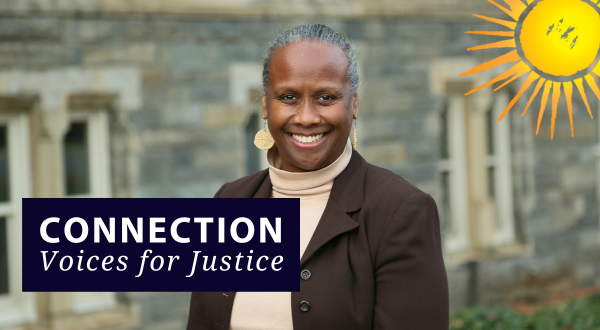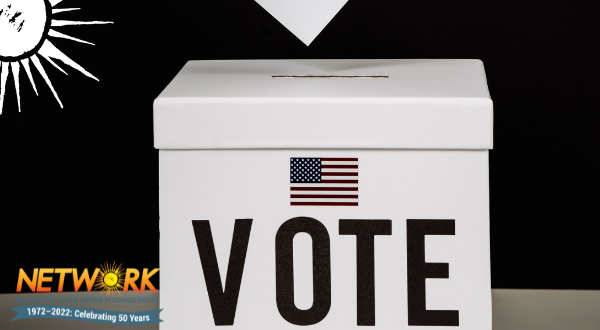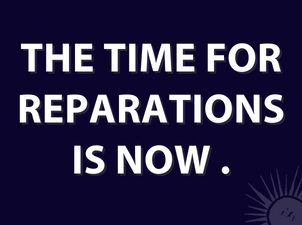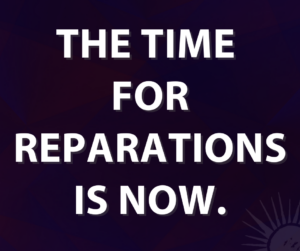
Encounter Changes Everything
Kim Mazyck
August 15, 2023
 Kim Mazyck is the associate director of the Initiative on Catholic Social Thought and Public Life at Georgetown University. She has served in key positions at Catholic Relief Services, Catholic Charities USA, and the Sisters of Notre Dame de Namur East-West Province. She is a graduate of Georgetown University’s Walsh School of Foreign Service with a degree in international relations and has a certificate in African studies.
Kim Mazyck is the associate director of the Initiative on Catholic Social Thought and Public Life at Georgetown University. She has served in key positions at Catholic Relief Services, Catholic Charities USA, and the Sisters of Notre Dame de Namur East-West Province. She is a graduate of Georgetown University’s Walsh School of Foreign Service with a degree in international relations and has a certificate in African studies.
She spoke with Connection about her work with the Initiative and what her journey has taught her about the power of dialogue and encounter.
What do you see as the factors that keep solidarity from taking root in our politics?
Kim Mazyck: I think it’s taking root in some places but not everywhere. I think mostly what we hear in the news is that which isn’t taking root. But I do think that there are politicians and political entities that are still considering what it means to walk with people, what it means to be in solidarity with them. There are some in politics who are really thinking about the impact on the least of these, those living in poverty, those living unhoused. I think there are many people really making sure that as we think about policy largely, we don’t get distracted with things that aren’t important, and we remain focused on people who are really struggling.
That being said, there seems to be a ton of infighting and a ton of distraction with other issues that don’t quite draw us into solidarity. They don’t have us think about the people who really need us to be considering them every time we think about policy and big decisions. I think that people are, to use the phrase we often use, not keeping their eye on the ball. When people are elected to represent a congressional district, or to the Senate, or to any office, even if it’s a local municipality, that comes with the responsibility of representing those people who have put you in office. Solidarity is when we think about, what’s impacting schoolchildren, are schoolchildren eating? How do we make sure people have the things they need, like Wi-Fi in a small county in which a lot of things are generally inaccessible? How do we make sure people can meet their basic necessities? I think some people are really speaking into that. But I also think that the voices that we’re hearing mostly are the ones that don’t speak into why that’s so critically important.
What was the call that you answered to engage on a path of solidarity?
KM: Before going to Georgetown I remember sitting in mass one Sunday … being challenged to think about service. That translated into me applying to and enrolling at Georgetown, eventually in the School of Foreign Service, thinking about diplomacy and the U.S. Foreign Service specifically.
I was in school during a time when the policy of apartheid loomed large in South Africa, and there were lots of protests on campus. By the end of my freshman year, I was very focused on African studies, primarily Sub-Saharan African. That really did shape and form my time there.
I spent a year after graduating teaching in South Africa, in a post-bacc program developed by Georgetown to put people in place to address the issues of what was going on in schools at that time in South Africa. I did that sort of thing for a year, and that year of service was the thing that shifted everything. I connect everything, even where I am now, back to that year in South Africa.
Bryan Stevenson said, “If you want to be a force for justice, you need to get proximate to people who are suffering.” You have worked with Catholic Relief Services and Catholic Charities USA. What did you learn about becoming a force for justice through proximity?
KM: I love Bryan Stevenson! I think the important thing about both the work of CRS and the work of Catholic Charities USA is that they are working to alleviate poverty, and to really address what’s going on in communities. Primarily at CRS, before I left and went to CCUSA, I led a number of delegation trips over to different countries in Africa, and that was where we got to encounter. It goes back to what Pope Francis says is so, so critical — that you encounter people.
Within that encounter, you may see suffering, you may see the impact of poverty, you may see what happens when people have been diagnosed with something like HIV, and you may think, there’s no hope. From trips to Uganda where I met night commuters, or communities protecting children from the LRA, to people living with extreme drought in Ethiopia, or a center for child brides… I’ve seen some incredible things. And yet, I always came back with the joy that I experienced more than anything else. I can look subjectively with my American eyes and say, wow, this is a situation I can’t imagine living in. And then I sit down and talk to somebody, I sit and spend some time with someone, and what I walk away with is my cup being filled with joy and community. I remember that I can’t just see them through the lens of poverty, through the lens of oppression, through the lens of a disease. There’s a full person there. And that full person is reminding me that I see God, and that God is also telling me that there’s joy in that experience.
For me, that reflection is what I see at the heart of CRS and the heart of CCUSA — encountering individuals. When we do that, we really know what the joy of the Gospels are all about. We know the joy that Pope Francis is reminding us about. That’s when we are in community with each other. Our brothers and sisters remind us that we’re on this journey together.
You’re at the Initiative, a convening space. Francis talks powerfully about dialogue, telling the U.S. bishops, “Dialogue is our method.” What have you learned about the power of dialogue?
KM: I’m so fortunate to sit with John [Carr], Kim [Daniels], Anna [Gordon], and Christian [Soenen]. What I’ve known about dialogue is that, again, it really fosters that sense of connection. That encounter is so critical. It brings back to me a quote from Pope Francis, that dialogue is the way of peace. Dialogue fosters listening, understanding, harmony, concord, and peace. That’s what we try to do.
When we set up these dialogues, we are trying to bring people who are maybe not on the same path or occupation. As we approach the issues, how can we bring them together to model what dialogue does? Pope Francis keeps reminding us that when we talk to each other, our opinions and approaches don’t seem as far apart as we think they are. When we focus on the heart of the matter, then we can really talk about what needs to be done. We can inspire not just those who are in that dialogue, but even other people if they experience it or watch it. I think we inspire them to have those same dialogues in their parishes, in their schools, and in their families, and hopefully on a larger scale in their communities, in the county, in the state, and in the country. That, to me, is really impactful.
Where do you see your perspective as a Black Catholic woman fitting into a convening space, in those dialogues?
KM: We want to have multiple perspectives, we want to have different ways of looking at an issue. My lived experience as a Black woman, and as a Catholic, all filters into how I see things — maybe differently from you, or John, or Kim. But by dialogue, we listen to each other. That’s when we begin to understand each other. And through that listening, we foster understanding. That’s what dialogue is about: not me coming in prepared to say, “oh, I need to make sure I hit these three points.” But listening to what the other person is saying so that I’m not just ready with my next response — I’m really processing. And that’s the only way we can talk about harmony, and the only way we can talk about really building community.
Compromise is a dirty word in so many spaces. How can lawmakers come together? In what ways can we work together, so that solidarity is not a casualty, and the most vulnerable people are not collateral damage?
KM: When we bring together our dialogues, we try to give a mix of perspectives, and I think that’s a tool. We continue to invite women religious, many of whom are on — I hate using the term “front lines” because it sounds so militaristic — but they are the ones responding in schools, in hospitals, in soup kitchens, in places where there’s the greatest need. And so we try to reflect that perspective, including with professors and lawyers, and we invite lawmakers to be a part of that so that they begin to also have a new perspective.
Again, it’s the modeling. We’ve done 151 dialogues; we’ve had almost 300,000 people listen to us. What does that change look like? How are people thinking differently? How are they conversing? We have a gathering after a dialogue, in person, so that there’s an opportunity for people to break bread, if you will — to talk, to have conversation, to not have to be on a microphone, so that they can ask a question maybe they were too embarrassed to ask in front of a large room.
We can’t be labeling each other because we disagree. When we’re invited into dialogue, we’re here together, we’re going to work on this together. That’s what Pope Francis is asking, too. The Initiative is saying that if we sit down and listen to each other, then we’re going to foster and better our understanding of each other. And even if we have completely divergent perspectives, we only get closer. It’s like anything — when you know somebody, it’s harder to demonize them, when you’ve actually sat next to them and had a conversation. Then they aren’t this person who thinks so differently than you. They are a human being with thoughts and a heart, like you. That goes back to solidarity. It’s when we see each other as both children of God, both built in the image and likeness of God.
What does healing our politics even begin to look like?
KM: The discourse of nationalism is about who is and who isn’t an American, but what I believe and know to be true is that we’re all Americans. We need to be more clear about that and have conversations about that.














